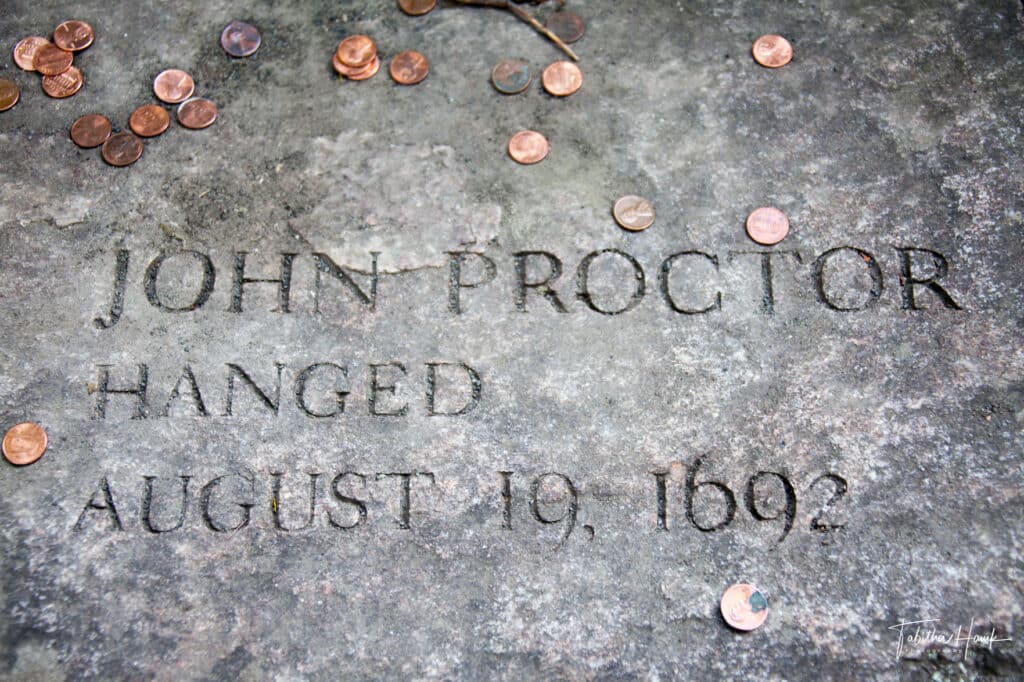John Proctor was born in England, and at the age of three, he and his parents sailed for America. Upon arriving in Massachusetts Bay Colony, the Proctor family settled in the Chebacco area of Ipswich.
John Proctor Sr. was an astute businessman and, throughout the years, purchased many properties. He would be considered one of the wealthiest men in Ipswich.
With money also came influence, especially in early Colonial America. He would hold various positions of influence and passion for his wealth to his children.
Years Prior to the Salem Witch Trials
Like his father, John Proctor was a shared businessman who did not mind working with any sort of person. He brokered deals with all who would participate.
He met and married his first wife, Martha Giddens, in 1653. The two went on to have four children, with only 1 surviving into adulthood. Martha died while giving birth to her son Benjamin in 1659.
Three years later, John married again. His second wife was Elizabeth Thorndike, the daughter of John Thorndike, who was the founder of Ipswich, Massachusetts. The couple went on to have seven children:
- Elizabeth (1663 - 1736)
- Martha (1665 - 1665)
- Martha (1666 - ?)
- Mary (1667 - 1668)
- John (1668 - 1748)
- Mary (1669 - ?)
- Thorndike (1672 - 1759)
By 1666, John Proctor had moved his family to Salem and leased a 700-acre estate, which he called Groton farm. He leased the land from Emanuel Downing, who was the brother-in-law of the infamous John Winthrop (often considered the founder of Massachusetts Bay).
In 1668, Proctor received his first license to operate a tavern here, and the license was renewed annually. The Inn was located on Ipswich Road, about a mile south of the Salem Village line. Elizabeth (Thorndike) Proctor died on 30 August 1672, shortly after she gave birth to their seventh child, Thorndike Proctor. Proctor's father also died in 1672, and he inherited ⅓ of the estate in Ipswich.
His brothers Benjamin and Joseph inherited the other ⅔ of the estate. Each portion was valued at 1200 pounds.
Two years after the death of his second wife, John Proctor married for the third time. This time, he married Elizabeth Basset, who was the daughter of William and Sarah Basset of Lynn, Massachusetts. The couple went on to have seven children:
- William (1674/5 - aft 1695)
- Sarah (1677 - 1751)
- Samuel (1685 - 1765)
- Elisha (1687 - 1688)
- Abigail (1689 - aft 1695)
- Joseph (bef 1691 - ?)
- John (1693 - 1745).
Elizabeth and some of the older children ran the tavern while Proctor and his son, Benjamin, tended to their extensive farm properties in Salem and Ipswich. If customers in the tavern had insufficient funds, Elizabeth insisted they pay with pawned goods.
Giles Corey became easily frustrated with his neighbors. At one point, he filed a lawsuit against Proctor, who had suggested that Corey was responsible for setting the Proctor house on fire. Later, one of Proctor's sons confessed.
Accusation and Trial
Initial accusations were aimed at Proctor's third wife, Elizabeth. When he began to defend her and vocally express his disbelief in the accusers, fingers were then pointed at him as well. Although Abigail Williams was John Proctor's chief accuser, he was also named by Mary Walcott, who stated he tried to choke her, and by his former servant Mary Warren on 21 April. Warren told magistrates that Proctor had beaten her for putting up a prayer bill before forcing her to touch the Devil's Book.
Further allegations of an increasingly salacious nature followed. Proctor continued to challenge the veracity of spectral evidence and the validity of the Court of Oyer and Terminer, which led to a petition signed by 32 neighbors in his favor. The signatories stated that Proctor had lived a "Christian life in his family and was ever ready to help such as they stood in need."
Despite clear testimony of the outstanding character of John and his wife, the Proctors were tried on 5 August 1692, found guilty, and sentenced to death by hanging.
While Proctor and his wife were still in jail, the sheriff seized all of their household belongings. The cattle were sold cheaply, slaughtered, or shipped to the West Indies. The beer barrels at the tavern were emptied. Their children were left with no means of support.
John Proctor was hanged on 19 August 1692.
Elizabeth, who was then pregnant, was given a reprieve until she gave birth, which came after the trials ended.
It would take years for Elizabeth to be restored and get back what was hers (if you can call it that). She would remarry and fight to have John's name cleared.

Conclusion
All the deaths in the Salem Witch Trials were terrible. Most of those targeted were easy targets who were poor and had little means to defend themselves.
John Proctor was different in that he was well-liked within the community, influential, educated, and wealthy. He was the only defendant to go after the use of spectral evidence and how it should not be admitted in court.
His death would shock many and begin the seeds of swift change.
